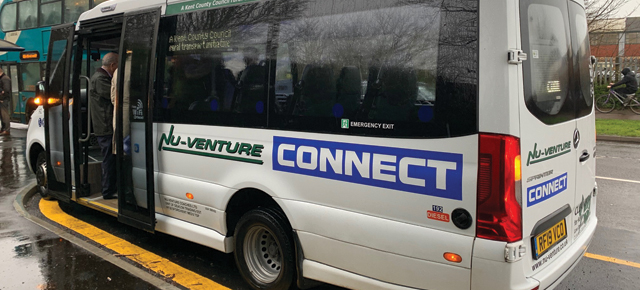Research has found that almost one in 10 bus services were axed last year as authorities in Kent and the West of England revealed plans for more cuts

Research by The Guardian that was published this week has found that almost one in 10 local bus services in Great Britain were axed last year, despite promises by the government to improve public transport as part of the levelling-up agenda.
Analysis by the newspaper of bus service registration data found the number of live registered bus services fell 9.5% between January 2022 and 2023. The West Midlands saw the greatest decline in services with 28.3% fewer live bus service registrations this month compared with January 2022.
The north east of England witnessed a decline of 15.9%; the north west 9.0%; the west 8.7%; the south east and London 6.0%; Wales 2.4%; and Scotland 0.3%. The only area to witness an increase was the east of England, with growth of 2.3%.
However, The Guardian warns a decline in registrations does not necessarily mean a reduced service level and could indicate services merging or routes being altered. But the apparent decline follows a trend that has continued for over a decade. Department for Transport figures suggest vehicle miles by local bus services in England fell 27% in the 10 years ending 2021-22. The pandemic has also had an impact, with a 16% reduction in vehicle miles between 2020/21 and 2021/22.
We have invested £2bn to mitigate the impact of the pandemic and help maintain existing bus routes and over £1bn through bus service improvement plans, while still maintaining the annual £250m bus service operator grant to support services.
A DfT spokesperson said the government was committed to the national bus strategy. They said: “We have invested £2bn to mitigate the impact of the pandemic and help maintain existing bus routes and over £1bn through bus service improvement plans, while still maintaining the annual £250m bus service operator grant to support services.
“We’ve also invested £60m to cap single bus tickets at £2 across England from 1 January to 31 March to tackle congestion and deliver real savings for passengers.”
The contraction of the network comes as a number of operators and local transport authorities grapple with patronage that is still in the doldrums in many areas, compounded by rising inflation and funding restraints.
Kent County Council has confirmed major changes to its supported bus network that were announced last summer (PT269). It will see 38 routes scrapped that will save £2.2m. They include a number of pilot schemes introduced in 2019 as part of a KCC project called ‘The Big Conversation’ which took a new approach to local bus service provision. That has seen some traditional country routes in the Maidstone area reduced to shorter, feeder services from rural villages connecting with ‘mainline’ commercial routes at the edge of the urban area.
Aylesford-based independent operator Nu-Venture is continuing three of the previously all-week services on a commercial basis until July, offering a once-a-week ‘there and back’ ‘shoppers bus’ and utilising a bus/driver spare between peak-time school runs. Local parish councils are publicising the changes while investigating how such services might be funded in the future.
Further bus cuts in the west of England have also been announced after combined authority members agreed to pull the plug on 36 of the region’s 69 subsidised bus services from April.
Mayor Dan Norris blamed the decision on some local councils paying “too small a transport levy” and claimed the West of England Combined Authority (WECA) had “about £20 a head per year” for their transport levy, compared to £60 a head in other regions.
In a briefing given to WECA members at the same meeting, Malcolm Parsons, WECA’s head of capital delivery, claimed that after some years of modest growth, “the commercial bus market in the West of England faces some serious challenges”.
He said a combination of poor patronage recovery, the proposed end of the Bus Recovery Grant on March 31, the continuing bus driver shortage and rising UK inflation meant the commercial bus network was now very fragile.
“There is a need to prioritise interventions on buses to strengthen the core commercial bus network and make it economically viable and sustainable,” explained Parsons.
If this core commercial network continues to shrink there is a risk of further decline where paying passengers are put off by poor, unreliable or non-existent services, leading to further revenue declines and further service cuts
“If this core commercial network continues to shrink there is a risk of further decline where paying passengers are put off by poor, unreliable or non-existent services, leading to further revenue declines and further service cuts.”
However, he said WECA’s BSIP funding provided “a one-off opportunity to turn that spiral of decline into real progress”.
While this funding could not be used to support the subsidised bus network, it could be used to fund new Demand Responsive Transport services to cover some of the service withdrawals.
“DRT is an innovative transport offer,” said Parsons. “It offers the additional advantage of more granular passenger movement data which we can use to make further public transport decision in the future.”
This story appears in the latest issue of Passenger Transport.
DON’T MISS OUT – GET YOUR COPY! – click here to subscribe!








